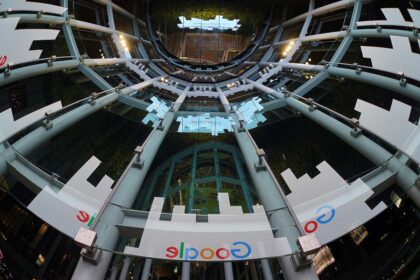Opinion by Bill Gates

AI tools can speed up the process of drug discovery significantly, Bill Gates writes. CNN/Getty Images/Adobe
The utilization of artificial intelligence for professional purposes, rather than mere novelty, became a reality for me this year. I believe this holds true for many individuals as well. Presently, we find ourselves at the initial stages of a significant technological shift. This period is both thrilling and perplexing, as it is filled with uncertainties regarding the impact of AI on the future. However, it is now more evident than ever that AI has the potential to enhance productivity and broaden access to education, mental healthcare, and various other domains.
My professional endeavors have consistently been centered around a fundamental concept: Progress is driven by innovation. This principle motivated the establishment of Microsoft by me. It also inspired Melinda and me to establish the Gates Foundation over twenty years ago. As a result, the quality of life for individuals worldwide has significantly advanced in the past century.
Since the year 2000, the global community has significantly reduced the mortality rate of children under the age of five — with innovation playing a crucial role in this achievement. Scientists have devised more efficient and cost-effective methods for producing vaccines, while ensuring their safety. They have also designed innovative delivery systems that can reach even the most isolated regions, thereby increasing access to immunization for more children. Additionally, new vaccines have been developed to shield children from life-threatening illnesses such as rotavirus.
In a world where resources are scarce, it becomes imperative to seek methods for optimizing effectiveness. The crucial element in achieving the highest possible outcome from each expenditure is innovation. Moreover, the advent of AI is poised to expedite the pace of groundbreaking advancements like never witnessed before.

The development of new medicines has been greatly influenced by AI, resulting in significant advancements in the process of drug discovery. Several companies have already begun utilizing AI tools to develop cancer drugs. The Gates Foundation places great importance on utilizing these tools to tackle health issues such as AIDS, tuberculosis, and malaria, which have a disproportionate impact on the world's poorest populations.
I am convinced that there is significant potential in leveraging AI to enhance the quality of life in low- and middle-income nations. My recent visit to Senegal allowed me to engage with numerous visionaries from emerging economies who are conducting groundbreaking AI research with the aim of positively impacting their local communities. Although many of their projects are still in the nascent phase, they are laying the groundwork for a substantial technological advancement in the coming years.
It is truly remarkable to witness the immense level of creativity being showcased. The teams I have encountered are diligently exploring the potential of AI in combating antibiotic-resistant pathogens, enhancing HIV risk assessment for individuals, facilitating easier access to medical information for healthcare professionals, and much more. The determination displayed by innovators from developing nations in addressing the significant obstacles faced by their respective communities is truly awe-inspiring.
Take into account this alarming fact: A woman loses her life while giving birth or during pregnancy every 120 seconds. The objective of a group from India is to utilize artificial intelligence in order to enhance the chances of survival. ARMMAN's extensive language model aims to serve as a supportive companion for healthcare professionals who are attending to high-risk pregnancies. Remarkably, it is adaptable to both English and Telugu languages, and what's even more fascinating is its ability to adapt to the proficiency level of the user, regardless of whether they are a novice nurse or a seasoned midwife.
Projects like these face a challenging journey ahead. There are major obstacles to overcome, including the need to expand projects while maintaining high standards, and ensuring sufficient backend access for long-term functionality.
To optimize their advantages, it is essential to address various risks related to AI, such as mitigating bias and hallucinations. Hallucinations occur when an AI system asserts something with confidence that is actually false, posing significant risks in fields like medicine. While some experts believe that hallucinations are an inherent issue in AI, I hold a different view. I am hopeful that with time, AI algorithms can be trained to differentiate between reality and falsehood. OpenAI, for instance, is making significant progress in this area. (Please note: Microsoft has a significant investment and partnership with OpenAI.)
It is imperative to ensure that AI products are customized to suit the needs of their users. One such exciting AI-based educational tool is Somanasi, an AI education tutor. The current pilot programs for AI education tools are truly remarkable as they are personalized for each learner. Somanasi, which translates to “learn together” in Swahili, will extend these advantages to students in Kenya. This tool has been meticulously designed to align with the local curriculum and take into consideration the cultural context, making it relatable and familiar to the students who utilize it.
It is truly motivating to witness the dedication of numerous researchers who are already contemplating the implementation of new technologies in low- and middle-income countries. By making strategic investments at present, artificial intelligence has the potential to create a more just world. It has the capability to minimize or even eradicate the delay between the introduction of an innovation in affluent nations and its adoption in less privileged regions. In countries with high incomes such as the United States, I anticipate that significant utilization of AI by the general public is only 18-24 months away. Conversely, in African nations, a similar level of AI integration is expected within approximately three years. Although there remains a disparity, this timeframe is considerably shorter compared to the delays observed with previous technological advancements.
Closing this disparity is crucial in addressing inequalities globally. Despite facing difficulties, I remain hopeful for the future as I consider the potential of AI in rapidly delivering groundbreaking technologies to those in need.













